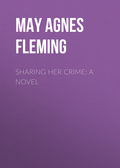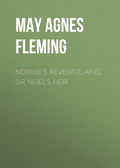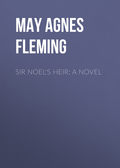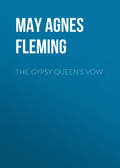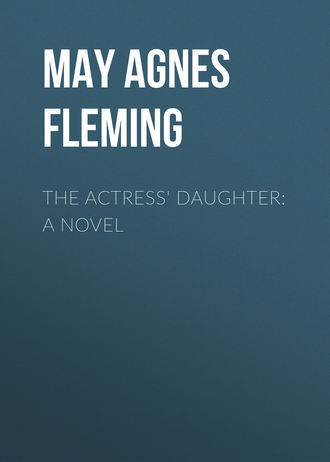
May Agnes Fleming
The Actress' Daughter: A Novel
"I am at your disposal, my dear Warren," said Georgia, with a smile and a sigh. "As you say, after all, a year more or less will not make a great deal of difference, and I am particularly anxious to continue our tour. Therefore, mon frere, do with me as you will."
With an account of that tour, dearest reader, I will not weary your patience – already, I fear, too much taxed. All "grand tours" are alike – the same sights are seen, the same incidents occur, the same scenery and pictures are looked at and gone into raptures over, and the same people are met everywhere. The summer was spent traveling slowly through France and Germany, and the winter was passed in Italy. Early in the spring they visited Switzerland; and, almost imperceptibly, two years passed away.
And where, meanwhile, was he whose willful blindness and haughty pride had brought on his own desolation? Where was he, widowed in fate though not in fact? – where was Richmond Wildair?
Home again, drowning thought and his intolerable remorse in the giddy whirl of political life. He had returned in time to close his mother's eyes, and hear her last words – a wild appeal for Georgia, the wronged Georgia, to forgive her. And then, with all the power of his mighty intellect, he had given himself up to the life he had chosen, that life for which Heaven and nature had so well qualified him – a great legislator – and that life became to him wife, and home, and all. Already he had taken his seat in the Senate, and, though perhaps the youngest there, stood foremost among them all, crowned with his lofty genius as with a diadem. The knowing ones whispered that at the next election he was certain of becoming Governor of his native State, and certainly, as far as popularity went, there could be little doubt of it. Never was there a young statesman, perhaps, who in so short a time had risen so rapidly to distinction, and won such "golden opinions" from all sorts of people.
Of almost all concerning his wife he was profoundly ignorant. One thing he knew, and that was that she, and no other, had painted the wonderful picture about which the artistic world was still raving. Hagar, in her mighty grief and dark despair, the wild, woeful, anguished form writhing yet majestic in her great wrongs, was Georgia as he had seen her last. And, as if to make conviction doubly sure, the picture bore her initials. One consolation it brought to him, and that was that she still lived. Every effort in human power he had made to discover her, but all he could succeed in learning was that a tall, dark, majestic-looking lady, bearing the name of Miss Randall, had received the prize; but nothing more was known of her. Then he sought for her brother, and heard he had gone to Europe, but whether alone or not he could not discover. A score of times within the day would Dick Curtis be on the point of telling him all, until the recollection of his promise would stop him, and he would inwardly fume at not having made a mental reservation at the time. Still, these tortures of doubt, and uncertainty, and hope, and despair served Richmond just exactly right, he argued, and would teach him, if he ever did find Georgia, to treat her better for the future.
And so, while Georgia was roaming over the world, Richmond was rising to still higher fame and eminence in his native land; and neither dreamed how each had searched, and sought, and sorrowed in vain for the other.
CHAPTER XXIV
AT LAST!
"And there was light around her brow,
A holiness in those dark eyes,
Which showed, though wandering earthward now,
Her spirit's home was in the skies."
Two years had passed and gone.
It was drawing toward sunset of a clear, bright, breezy day, when a crowd of people "might have been seen," and were seen, too, hurrying down to one of the wharves of B – , to watch the arrival of the steamer from Europe. Throngs of people who had friends on board came trooping down, and watched with eager eyes the stately vessel as it smoked and puffed its way, like an apoplectic alderman, to the shore.
Among these lounged a young man, good-looking and fashionably dressed, and evidently got up regardless of expense. There was a certain air of self-complacency about him, as he stroked a pair of most desirable curling whiskers, that said, as plainly as words, he was "somebody," and knew it. Another young republican, puffing a cigar, stood beside him, and both were watching, with the careless nonchalance of sovereigns in their own right, the throng of foreigners that stood on the steamer's deck.
"A crowd there – rather!" remarked the hero of the cigar, as he fastidiously held it between his finger and thumb and knocked the ashes off the end. "Our European brethren have arrived in time to see the elephant to good advantage. Young America will be out in great force to-night."
"To cheer the new governor – ye-es," drawled the other, as he, too, lighted a cigar, and began smoking like a living Vesuvius.
"What a thing it is to be the people's favorite – a man of the people, that style of thing, you know – isn't it, Curtis?" said the first speaker.
"I believe you!" said Mr. Curtis, emphatically, for our old friend it was. "It is the sovereign people's pleasure to go mad about their favorite just now, and, like spoiled children, they must be humored. What a thing the mob is, to be sure! They would shout as heartily and with as good a will if Wildair were to be hung to-night as inaugurated. Since the days when they shouted 'Crucify Him! crucify Him! Release unto us Barrabas!' they have remained unchanged."
"I hope you don't mean to insinuate that there is any resemblance between the Jewish malefactor and the American governor – eh, Curtis?" said his friend, laughing.
"By no means, Captain Arlingford. Wildair deserves his popularity; he is a great statesman, a real friend of his admirers, the people, and with genius enough to steer the whole republic himself. He has fought his way up; he has fought for equal rights, liberty, fraternity, equality – the French dodge, you know – and deserves to be what he is, the people's idol. Never in this good Yankee town was a new governor greeted so enthusiastically; never did the mob shout themselves hoarse with such a right good will. By Jove! I envied him to-day, as he stood on the balcony of the hotel, with his hat off, while the sea of human beings below shouted and shouted, until they could shout no longer. It was a reception fit for a king; and never did a king look more kingly and noble than at that moment of triumph did he."
Captain Arlingford laughed.
"Whew! there's enthusiasm for you! My sober, steady-headed friend, Dick Curtis, starting off in this manner, and longing for public popularity! I confess I should like to have witnessed his triumphal entry to-day though. I have heard that the ladies absolutely buried him alive in the showers of bouquets from the windows."
"Didn't they!" said Mr. Curtis laughing at the recollection. "As his secretary, I sat in the carriage with him, and, 'pon my honor, I was half smothered under the load of fragrant favors. Such a waving of cambric handkerchiefs, too, and how the crowd doffed their hats and hurrahed! It excites me even yet to think of it; but there sat Wildair touching his chapeau, and bowing right and left, 'with that easy grace that wins all hearts,' to quote our friend and your admirer, Miss Harper, a little."
"That last bill about the people's rights did the business for him," said Captain Arlingford, meditatively; "what a strong case he made out in their favor, and what an excitement it created! Well, it's a famous thing to be clever, after all; I knew it was in him, but it might never have come out so forcibly, had it not been for that loss of his two years ago. And it appears she is a genius too. To think she should have painted that blood-chilling picture of Hagar, and found a brother in that poet, Randall. Don't things turn up strangely, Curtis? I wonder where she has gone, and if she will ever come back."
"Don't know! Like as not," said Mr. Curtis, sententiously.
"Splendid-looking girl she was, wasn't she, Curtis?" continued Arlingford, pursuing his own train of thought.
"Magnificent eyes, a step like an empress, and the smile of an angel."
"Come, don't draw it quite so steep, my gallient saileur boy," said Curtis; "recollect you're speaking of another man's wife, and that man not a common mortal either, but the Governor of B – and future President of these Benighted States. Besides, what would Miss Harper say?"
"Miss Harper be – hanged!" exclaimed Arlingford, with such impatient vehemence that Curtis laughed; "that's enough about her. Are you going to the inauguration ball to-night?"
"Of course – what a question! Do you think they could have a ball fit to be seen without the presence of the irresistible, the fascinating Richard Curtis, Esq., to keep it moving? Do you think any lady as is a lady would enjoy herself if I was absent? Echo answers, 'Of course, they wouldn't;' so don't harrow my feelings again by such another question."
"Well, I see humanity and vanity are not among your failings. I suppose all the elite of the city will be there?"
"You had better believe it. The creme de la creme of B – . All the beauty, and wit, and gallantry of the city, as the newspapers have it. I have engaged with the editor of the Sky Rocket to write him an account of the sayings and doings, for a 'consideration,' as the delicate phrase goes, which, being translated from the original Hebrew, means that he will puff our party on every occasion and no occasion, and if you don't see 'among the guests was the gallant young Captain A – , U. S. N., who paid during the evening the most marked attention to the lovely and accomplished Miss H – , whom it is whispered he is about to lead to the hymeneal altar – ' Hello! stop that! I say, Arlingford, don't choke a fellow!"
"Confound you!" said Captain Arlingford, catching him by the collar, and fairly shaking the cigar out of his mouth; "will you forever continue harping on that string? I say, let's get out of this; I hate to make one in a crowd."
"No; wait," said Curtis, laughing and adjusting his ruffled plumage. "I want to see if there is any one I know on board the steamer; I expect some friends. Here come the passengers. What a wretched, sea-sick, sea-green-looking set. The amount of contempt I have for the ocean is something appalling."
"You had better mind how you express it before me," said Captain Arlingford, decidedly. "I – but look there, Curtis, at that lady! Oh, ye gods and little fishes! what a Juno! Eh? how? what? By the Lord Harry, Curtis!" he exclaimed, springing up excitedly, as the lady in question turned her face fully toward them; "if ever I saw Mrs. Georgia Wildair in my life, there she stands!"
"Where? where? where?" fairly shouted Curtis, catching him by the arm, and staring round in an excitement far surpassing his own. "Where? which? when?"
"Whither? why? wherefore?" said Arlingford, laughing in spite of his surprise and excitement. "There, man alive! don't you see? That tall lady in black on the deck beside that intensely foreign-looking young gentleman. Why, where are your eyes? don't you see?"
"I see! I see! It's she! Hip, hip, hurrah!" shouted Mr. Curtis, waving his hat, and electrifying the crowd around him, and then, before Captain Arlingford knew what he was about, he darted off, played in and out through the crowd, dug his elbows into the ribs of all around him, and so forced his way aboard the steamer, amid the stifled shrieks and groans, and curses of his victims.
"That's what you call a summary proceeding," said Captain Arlingford, laughing; "what a living galvanic battery that fellow is – a broad-clothed barrel of gunpowder; touch him and off he goes! Well, here's to follow his example."
So saying, but in a less impetuous manner, he made his way through the throng to where stood a lady, "beautiful exceedingly," and dressed entirely in black, after the fashion of the Spanish Creoles, for one of whom, in her dark, rich beauty, she might easily have been mistaken.
"Mrs. Wildair! Good gracious, Mrs. Wildair, how do you do?" exclaimed a breathless voice. "To think that you should come this day of all days! Oh, scissors! Well, I am glad to see you! Upon my word and honor, I am."
"Mr. Curtis!" exclaimed the lady, with a little cry of surprise and delight. "Why, what an unexpected pleasure to meet you here! Dear Mr. Curtis, how glad I am to see you!"
"So am I, just as glad!" said Mr. Curtis, seizing the little hand she extended, and wringing it until she winced. "Good gracious! to think of it. How do you do? Well, if it isn't the most unexpected – to think that you should come home to-day of all days! Good gra – Hey? what now?"
A vigorous slap on the shoulder that staggered him, as well it might, had jerked the last words out of him, and turning fiercely round, he saw the laughing face of the lady's companion turned toward him.
"Why, Curtis, old fellow, have you a greeting for no one but Georgia? Come, you have shook her hand long enough; try mine now."
"Randall, my boy, how goes it? Well, I am glad, and no mistake. Good gracious! what the mischief kept you so long in those barbarous foreign parts, anyhow?"
"Don't know, really," said Mr. Randall, laughing at his vehemence; "the time passed almost imperceptibly. But you – what brings you here? I thought you were in New York."
"Well, I am not, though you mayn't believe it. Hello! Guess who this is, Mrs. Wildair?"
"Captain Arlingford!" exclaimed Georgia, delightedly, holding out her hand; then, as the recollections of the past arose, the color mounted for an instant to her very temples.
"Yes, marm; nothing shorter," said Curtis, rubbing his hands gleefully. "Je-rusalem! only to think of it! Well, the astonishing way things will persist in turning up! Just to think of it. Why, it's like a thing in a play or a novel. Now, isn't it, Arlingford?"
"What! our coming home?" said Randall. "What do you see so extraordinary about that, Curtis?"
"No, it is not that," said Mr. Curtis, chuckling; "it's the remarkable coincidence of your coming to-day of all days – not you, but your sister. There, don't ask me now, everybody's looking – a set of ill-mannered snipes. Arlingford, run and call a coach, there's a good boy, and I'll tell Mrs. Wildair all about it. Good gracious! if it isn't the funniest thing!"
Mr. Curtis' excitement and delight, as he danced up and down, rubbing his hands and chuckling, were so irresistible that all three, after watching him an instant, burst into an immoderate fit of laughter, and, beholding his look of dismayed surprise, laughed until the tears stood in their eyes.
"Eh! why, what the – what are you laughing at? Don't act so, don't; everybody's looking, and they'll think you're crazy," said Mr. Curtis, imploringly. "Wait a minute, I'll call a coach myself – you just hold on."
Off darted Mr. Curtis, leaving them still laughing and unable to stop, and ere five minutes he was back, and whipped them off like a living whirlwind – pushed them into a coach, jumped in after, and banged the door.
"Dixon's Hotel!" he bawled to the driver, and away they rattled over the pavement.
"Now we're comfortable," said Mr. Curtis, surveying them complacently, "and, only for me, you might have stood there all night, for coaches are in demand, and hardly to be got for love or money. Oh, Jehosaphat! just to think of it! why it's droll!" said Mr. Curtis, thrusting his hands into his pockets, and, as the absurdity of it struck him for the first time he leaned back in the carriage, and burst into a peal of laughter that was perfectly terrific, and from the effect of which he did not recover until they reached the hotel.
"It's lucky for you, in more ways than one, that you met me," said Mr. Curtis, as he got out and offered Georgia his arm, "for the city's full, and you wouldn't have got a room in a hotel from one end of it to the other – no, not if you went on your two blessed, bended knees and prayed for it. Here, these rooms were engaged for the governor and his suite, and this is mine, and is quite at your disposal, Mrs. Wildair."
"But, oh! Mr. Curtis, I cannot think of depriving you – "
"There – not a word! not a word!" said Mr. Curtis, briskly, as he ushered them into a sumptuously furnished apartment. "I'll camp with somebody else. And now the very first thing I want you to do is to dress and come to the ball to-night."
"The ball! What ball?" said Georgia, in surprise.
"Why the inauguration ball, to be sure! Oh, I forgot you did not know. Well, then, the astonishing news is, that Mr. Richmond Wildair has this day entered B – as its governor! Now don't faint, Mrs. Wildair, because I won't understand your case. And, as usual, there is to be a ball, and I want you to come and be presented to his excellency the governor."
Georgia had no intention of fainting. A flush of pride, and triumph, and delight, lit up her face, and, with the step of a queen, she arose and paced up and down the room.
"And so he has been elected," said Mr. Randall, thoughtfully. "I knew he would rise rapidly."
"What says Georgia – will you go?"
"Yes," she said, with a radiant smile.
"Hooray!" exclaimed Mr. Curtis; "Mrs. Wildair, you're a brick! Maybe Mr. Wildair won't be astonished some, if not more, and a leetle delighted! It's getting dark fast, and I ought to be off to the executive mansion; but I'll let etiquette go be hanged for once, and wait for you. You had better have tea in your own room, Mrs. W.; sha'n't I ring? It will take you two or three hours to dress, you know – it always does take a lady that long, I believe. Here, my man, supper for four up here; be spry now."
It was impossible to be serious and watch Curtis, as he flew round impetuously, asking a thousand questions in a breath about what they had seen abroad, and then interrupting them in the middle of the answer to tell them something about Richmond, that had not the slightest bearing on the matter.
In his excitement he found it impossible to sit still, but kept flying round the room, rubbing his hands in an ecstacy of delight, and laughing uproariously as he thought of the surprise in store for the young governor. During supper he monopolized the whole conversation himself, and kept the others in fits of laughter, while his look of innocent astonishment at their mirth would, as Captain Arlingford said, "make a horn-bug laugh."
After tea the gentlemen took themselves off to dress, and Georgia's maid, who had arrived, remained to superintend her mistress' toilet. Those two years of absence had restored the bright bloom to Georgia's dark face, but the old flashing light had left her dark eyes, and in its place was a sweetness, subdued, gentle, and far more lovely. The haughtily curling lips were tender and placid, the queenly brow calm and serene, the dark, beautiful face almost seraphic with its look of inward peace. Oh, far more sweet, and tender, and lovable was the Georgia of to-day than the haughty, fiery, passionate Georgia of other years! As she stood before the mirror, in her rich, showy robe of gold-colored satin, under rare old point lace, with diamonds flashing in rivers of light around her curving throat, flashing in her small ears, gleaming in her midnight hair, and glittering and scintillating like sparks of fire on her rounded arms and small dark fingers, she looked every inch a princess, a "queen of noble Nature's crowning."
And so thought the gentlemen as they entered, in full dress – in "glorious array," as Mr. Curtis pompously said – if one might judge by her brother's look of pride and pleasure, Captain Arlingford's glance of intense admiration, and Mr. Curtis' burst of rapture.
"Why, you're looking splendid, absolutely splendid, you know; something quite stunning, Mrs. Wildair! Ah! I should like to be as good-looking as you. I never saw you looking so well before. Now, did you, Randall?"
"Georgia is looking her best," said Mr. Randall, smiling.
"Looking her best! I guess so! It's astonishing how handsome women can make themselves when they choose. Now, I might try till I was black in the face, and still I would be the old two-and-sixpence at the end. I wish I knew the secret. Suppose we go now; we're behind time three quarters of an hour as it is. The carriage is waiting, Mrs. Wildair."
"I am quite at your service, Mr. Curtis," said Georgia, flinging a shawl over her shoulders, and trying to smile, but her heart was throbbing so rapidly that she leaned against the table for a moment, sick and faint.
Who, when about to meet a dear friend from whom she had been long separated, does not feel a sort of dread mingling with her pleasure, lest she should find him changed, altered, cold, different from what she had known him in other years?
So felt Georgia as she took her seat in the carriage and was whirled as rapidly as the crowded state of the streets would admit toward the executive mansion. Her color came and went, now that the crisis was at hand, and the loud beating of her heart could almost be heard, as she lay back among the cushions, trembling with excitement and conflicting emotions.
A gay scene the streets presented that night. Never had a governor received such an ovation as had this young demi-god of the dear public. Every house was illuminated from attic to basement; flags were flying; arches had been erected for him to pass under, as if it were the reception of a prince. Thousands of gayly dressed people thronged the pavements, bands were out playing triumphant marches, and an immense crowd congregated around the governor's house, watching the different carriages as they passed, bearing their freight of magnificently dressed ladies on their way to the ball. But not to behold them was the dense crowd waiting, but to catch a glimpse of the young governor when he should arrive.
As the carriage conveying our party approached the arched gate-way of the executive mansion it was stopped, blocked up by a crowd of other carriages. The people had pressed before, and it was in vain they tried to get on. Drivers swore, and shouted, and vociferated, the mob laughed and bandied jokes, gentlemen in commanding tones gave orders that were either unheard or impossible to be obeyed, and a perfect Babel of confusion reigned.
"Come, this won't do, you know," said Mr. Curtis, "we must get on somehow. Here, you fellows," he said, thrusting his head out of the window, "get out of the way, I want to pass. I'm the governor's secretary, and must get on."
A derisive laugh from a group near followed, and a voice in the crowd inquired anxiously whether his mother had many more like him, and also whether that venerable lady was aware that he was out.
Mr. Curtis showed symptoms of getting into a passion at this, but his voice was drowned in a cry from a band of loafers near, who shouted:
"We want to see the governor! You won't pass till we see the governor!"
There was a plain dark carriage right in front of them, and now the glass was let down, and a clear, commanding voice, that rang out above all the din, calmly said:
"I am the governor! Stand aside, my friends, and let me pass!"
That voice! Georgia half-sprang from her seat, and then fell back.
Such a cry as arose – such a mighty shout, at the voice of their favorite! The crowd swayed to and fro in their struggles to get near. The driver whipped up his horses, a passage was cleared, and carriage after carriage passed on and entered the crowded court-yard.
"Hurrah for Wildair! Hurrah for Wildair! Hurrah! Hurrah! Hurrah for Wildair!" shouted the crowd, till the welkin rang.
"Hurrah for Richmond Wildair – the Man of the People!" exclaimed a loud voice, and instantly the cry was taken up, and "Hurrah! hurrah! hurrah!" rang out like the roar of the sea.
And now on the balcony, clearly revealed in the light of myriads of lamps, stood the kingly form of Richmond Wildair himself, his princely brow uncovered, his calm, commanding face looking down on them, as a king might on his subjects.
And then once again arose the mighty shout, "Hurrah for Wildair! Hurrah for Wildair! Hurrah for the Friend of the People!" until, hoarse with shouting, the swaying multitude relapsed into silence.
And then, clear, calm, and earnest, arose the commanding voice of their favorite, as he addressed them.
A dead silence fell on that great crowd the moment his first word was heard. Short, and well chosen, and to the point, was his speech; and hats flew off, and again and again the hoarse cheers of his listeners interrupted him. Having thanked them for the enthusiastic reception they had given him, he begged them to disperse for the present, and then, having bowed once more, he retired.
With three times three for the speaker they obeyed, and, save a few who remained to watch the brilliantly illuminated mansion and listen to the music of the band, the crowd soon dispersed through the thronged streets.
"There's popularity for you!" said Mr. Curtis, as with Georgia leaning on his arm he entered the brilliant ball-room, blazing with lights and crowded with splendidly attired ladies. "I should admire to see them cheering me that way. How would it sound, I wonder? Hurrah for Curtis! That's not bad, is it, Mrs. Wildair?"
She did not reply – she did not hear him. Her eyes were wandering through the glittering throng in search of one, the "bright, particular star" of the evening. Yes, there he was, at the upper end of the room, surrounded by a throng of the most distinguished there, bowing, and shaking hands, and smiling, and chatting with the ladies. She strove to calm herself and listen to what her companion was saying, but in vain, until the mention of Richmond's name attracted her attention.
"I won't bring you over among that crowd," he was saying; "I'll wait till he's a little disengaged. They'll begin dancing presently, and then the coast will be clear. Just see how everybody is looking at you and whispering to one another. I guess they would like to know who you are just now. Ah! what would you give to know?" said Mr. Curtis, making a grimace at the crowd.
And now an audible whisper might have been heard among the throng:
"Who is she? oh, who is she? – that beautiful girl with Mr. Curtis. I never saw her before."
"Nor I. Nor I. Who can she be?" ran around the room. "How distingue she is! how surpassingly beautiful! and how magnificently dressed! Oh, I must get an introduction. See, he is bringing her up now to present her to the governor. I'll ask him to introduce me. She is certainly destined to be the belle of the evening."
Meantime two or three quadrilles had formed, and the group surrounding the governor had thinned, and he was left as much alone as he was likely to be during the evening. Leaning against a marble pillar, he stood talking to a starred and ribboned foreigner, and when Curtis approached with Georgia, he was so engrossed with the topic they were discussing that he did not observe him until his voice fell on her ear.
"Mrs. Wildair, your excellency!" said Mr. Curtis, in the most emphatic of voices, standing right before him.
He started up, staggered back, grew deadly pale, and grasped the marble pillar for support.
Yes, there before him, radiant in her beauty, with serene brow and calm smile, stood his long-lost wife – face to face at last!



